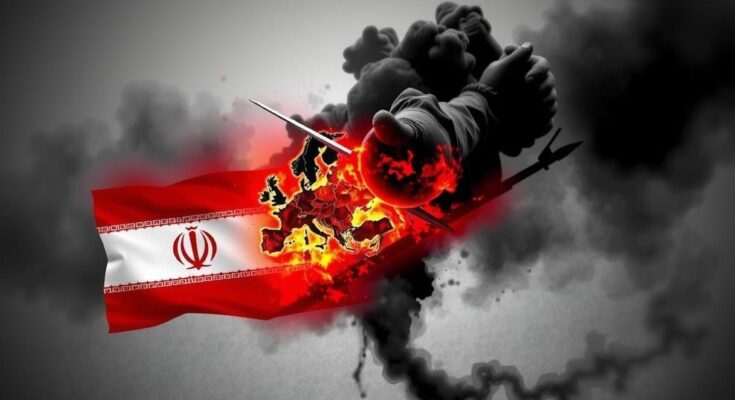Iran supports Syrian President Bashar al-Assad as opposition forces escalate their offensive to overthrow the regime. The Iranian government warns against potential regional conflict and expresses skepticism about Turkiye’s backing of certain insurgent groups. There is discussion of direct Iranian military involvement, but analysts remain cautious of the implications of such a move amid existing geopolitical tensions.
Iran has maintained its support for Syrian President Bashar al-Assad amidst escalated military actions by opposition forces aiming to topple his regime. As Iranian Foreign Minister Abbas Araghchi observed after a meeting in Doha that included Russia and Turkiye, the need for political dialogue between the Syrian government and recognized opposition groups is essential. Iran perceives the uprising as part of an external conspiracy, primarily orchestrated by the United States and Israel, aimed at dismantling the Syrian state.
In light of recent military developments, including a significant offensive launched by opposition forces from Idlib, Iranian authorities have cautioned against the potential spread of conflict throughout the region, especially considering the volatile situation related to Israel’s activities in Gaza. The Iranian government has warned that the situation poses a risk to its own territorial and geopolitical interests.
Tensions have also arisen concerning Turkiye’s backing of certain opposition factions, notably the Hayat Tahrir al-Sham (HTS), with Iranian officials expressing skepticism over Ankara’s alignment with what they view as Western-backed insurgents. Iran’s messaging has shifted to label the armed opposition as merely “armed groups,” attempting to reframe the narrative surrounding the conflict.
While Iran’s foreign ministers and security advisors maintain that direct military intervention may be on the table, any such deployment would mark a significant escalation in Iran’s involvement in the Syrian conflict, moving beyond its typical reliance on proxy forces. Within the current military context, some Iranian officials have voiced strong emotions regarding the potential loss of strategic allied territories in Lebanon and Iraq, should the Assad government collapse.
The potential ramifications of increased Iranian military involvement are concerning. Analysts suggest that Iran’s participation could further entangle the region in conflict, especially considering the existing Israeli military operations and ongoing geopolitical tensions. The comments from Iranian lawmakers indicate a growing urgency to act, while military experts remain skeptical about the feasibility of sending significant Iranian troops into Syria, given the present geopolitical climate.
The Syrian conflict, which began in 2011, has transformed into a complex battleground of international interests, including those of Iran, Turkiye, Russia, and Western nations. Iran has historically positioned itself as a staunch ally of the Assad regime, viewing its survival as critical to maintaining its influence in the region. Within this context, the current military offensives by opposition groups, particularly under the banner of HTS, signify a renewed challenge to Iranian interests. The regional landscape has also been complicated by Israeli military operations against Iranian positions, raising the stakes for Tehran in its support for the Syrian government.
In summary, Iran’s stance on the Syrian conflict remains firmly rooted in its commitment to support Bashar al-Assad, while concurrently reframing the opposition as foreign-backed entities attempting to destabilize Syria. Despite the potential for a direct involvement of Iranian troops, officials express hesitation, weighing the risks against potential losses in strategic allies if the Assad regime collapses. The broader implications of these developments may have significant consequences for the ongoing geopolitical dynamics in the Middle East.
Original Source: www.aljazeera.com




